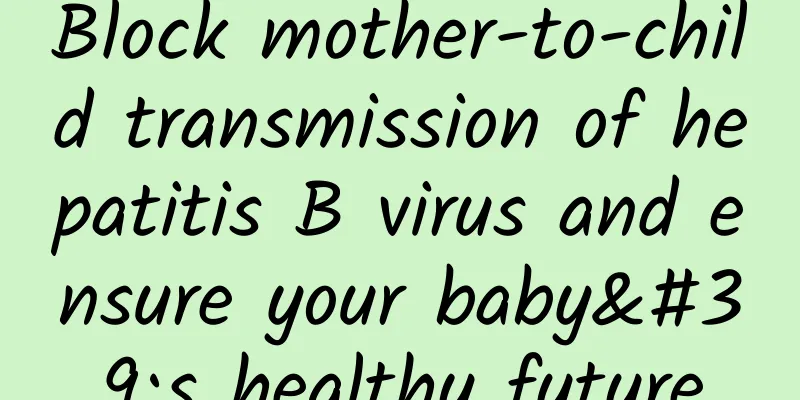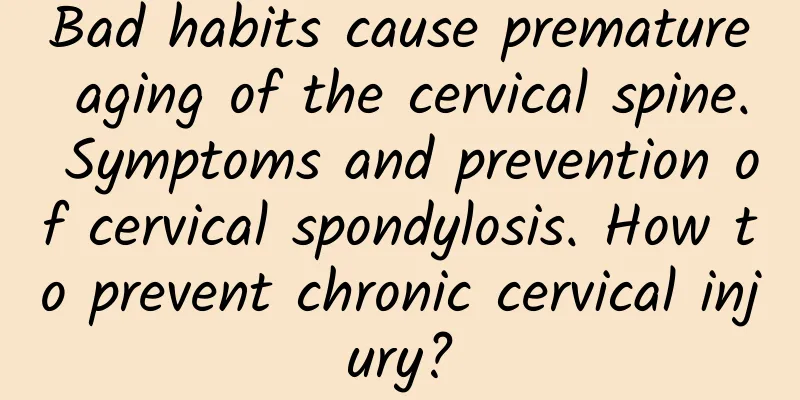Block mother-to-child transmission of hepatitis B virus and ensure your baby's healthy future

|
Author: Hu Fang, deputy chief physician of Guangzhou Women and Children's Medical Center Reviewer: Wang Qian, researcher at the Maternal and Child Health Center of the Chinese Center for Disease Control and Prevention 1. What are the dangers of babies being infected with hepatitis B virus? Hepatitis B is a type of viral hepatitis caused by infection with the hepatitis B virus (HBV). It is a preventable but difficult to treat infectious disease. 90%, 20% to 50%, and 5% to 10% of babies infected with HBV during the perinatal period, infancy, and at the age of 5 years or older will develop chronic HBV hepatitis B, respectively. That is, the younger the age of infection with HBV, the higher the probability of chronic infection in the future. Once HBV infection becomes chronic, about 25% of patients will eventually develop cirrhosis and hepatocellular carcinoma. HBV infection seriously endangers human health and imposes a heavy economic burden on children's physical and mental health, families, society, and the country. Figure 1 Copyright image, no permission to reprint 2. If the mother is infected with hepatitis B virus, what is the risk of the baby being infected with hepatitis B virus? my country is a country with moderate prevalence of hepatitis B virus infection, with about 93 million people carrying the virus. Most of the infections are caused by early hepatitis B virus infection in babies, and mother-to-child transmission is the main route of hepatitis B virus infection. If the baby is not vaccinated with hepatitis B immunoglobulin and hepatitis B vaccine after birth, the baby born to a mother infected with hepatitis B virus (hereinafter referred to as "hepatitis B mother") will have a 30% to 42% chance of being infected with hepatitis B virus. If the baby is vaccinated with hepatitis B immunoglobulin and hepatitis B vaccine after birth, the probability of being infected with hepatitis B virus will drop to 5% to 15%. In addition, after babies born to mothers with hepatitis B complete three doses of hepatitis B vaccine, the incidence of no/weak response to the hepatitis B vaccine is as high as 27.5% to 30.2%, which is much higher than that of babies born to mothers without hepatitis B (5% to 10%). The lack/weak response of babies to the hepatitis B vaccine increases their risk of hepatitis B virus infection in the future. Therefore, blocking mother-to-child transmission is the key to controlling hepatitis B infection. 3. If the mother is infected with hepatitis B virus, how to prevent the baby from being infected? 1. Choose the right time to get pregnant Before planning pregnancy, women with chronic hepatitis B virus infection should have their liver biochemical indicators, hepatitis B virus load (HBV DNA), liver ultrasound and transient elastography evaluated by an infectious disease or hepatology specialist, and receive individualized treatment based on the doctor's evaluation results. When receiving drug treatment, they should choose drugs that do not affect pregnancy. 2. Pay attention to monitoring your condition during pregnancy Women with chronic hepatitis B virus infection should have their liver function checked regularly after pregnancy, especially in the early and late stages of pregnancy. HBV DNA should be checked in the second trimester. If the HBV DNA is higher than 2×105IU/ml, antiviral treatment should be given to reduce the viral load, thereby further reducing the risk of the baby being infected with hepatitis B virus. 3. After the baby is born, go to a regular institution for vaccination in time Giving babies hepatitis B vaccine and hepatitis B immunoglobulin is the most effective measure to prevent hepatitis B virus infection. All babies born to mothers with hepatitis B should be injected with 100 international units of hepatitis B immunoglobulin within 12 hours after birth (the sooner the better), and the first dose of hepatitis B vaccine at the same time, and a dose of hepatitis B vaccine at one month and six months. Hepatitis B immunoglobulin has almost no adverse reactions, and neonatal rescue does not affect the application of hepatitis B immunoglobulin. For critically ill newborns (such as extremely low birth weight infants, severe birth defects, severe asphyxia, respiratory distress syndrome, etc.), the first dose of hepatitis B vaccine should be administered as soon as possible after vital signs stabilize. Newborns born to hepatitis B mothers with a birth weight of less than 2 kg should also receive the first dose of hepatitis B vaccine as soon as possible after birth, and receive a dose of hepatitis B vaccine when the baby is 1 month old, 2 months old, and 7 months old, for a total of 4 doses of hepatitis B vaccine. 4. Babies should receive regular testing and daily protection (1) Babies born to mothers with hepatitis B can be breastfed after receiving hepatitis B immunoglobulin and the first dose of hepatitis B vaccine. During breastfeeding, mothers with hepatitis B should take more rest and have their liver function checked regularly. If their liver function is abnormal, they should go to the hospital for treatment in time. (2) When feeding complementary foods to your baby, do not chew the food before feeding it to your child. This is because the oral microorganisms of adults are different from those of children, and chewing food before feeding can easily cause children to become infected with diseases. (3) In daily life, babies should be prevented from coming into contact with the blood of people infected with the hepatitis B virus, and separate tableware should be prepared for the baby. (4) Babies born to mothers with hepatitis B should go to the hospital for hepatitis B infection and immune status testing 1 to 2 months after the last dose of hepatitis B vaccine or when the baby is 7 to 12 months old. The doctor will take appropriate intervention measures based on the baby's test results to build a safety protection door for the baby. Finally, it is important to remind you that cesarean section does not reduce the probability of mother-to-child transmission of hepatitis B. Let us work together to block mother-to-child transmission of hepatitis B and help mothers with hepatitis B give birth to healthy babies. Figure 2 Copyright image, no permission to reprint |
<<: Will an excessively long foreskin cause harm to sexual partners?
>>: What is the difference between liver fibrosis and liver cirrhosis? Can it be cured?
Recommend
How much harm does abortion do to the body?
Every woman needs to try to realize the great har...
What should we pay attention to when we have a flow of people?
It is sacred for women to be mothers, but if they...
Are bilateral breast hypoechoic nodules of type 3 serious?
Bilateral breast hypoechoic nodules type 3 cannot...
Anemia range table for pregnant women
When women enter pregnancy, the changes in body h...
A blood type personality woman
We all know that there are four major blood types...
What are the dangers of a second abortion?
When women have an unexpected pregnancy, they nee...
Treatment of spinal pain after cesarean section
Many of us who have had caesarean sections may be...
Can I eat bitter melon after abortion?
For some people who have experienced an unexpecte...
What is the luteal phase of menstruation?
For women, they may often hear terms such as ovul...
What is the reason for the baby's cough as if there is phlegm? How to remove the phlegm from the baby's throat?
If an adult has phlegm in his throat, he can coug...
How can women prevent premature ovarian failure?
Aging is what women are most worried about and co...
What is the cause of sticky blood streaks during menstruation?
Menstruation is the normal physiological cycle of...
Is it normal to have stomach pain during pregnancy?
During the first three months of pregnancy, the f...
Age when women should eat royal jelly
Maintaining a beautiful appearance and a healthy ...
Female left kidney pain
The structure of the human body is very peculiar....


![[Smart Farmers] World Allergy Day丨How to protect “sensitive you” in the hot summer?](/upload/images/67f1a4d230ab4.webp)






